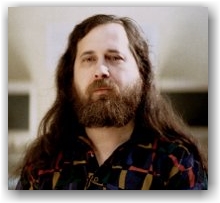
Direct download as Ogg (00:09:52, 5.5 MB)
Summary: Stallman speaks about erosion of freedom on the Internet
TODAY’S part deals largely with the Internet and the full transcript follows.
Dr. Roy S. Schestowitz: I read an article yesterday in the Canadian press, I think it was CBC, writing about the ban effective today or yesterday of using a mask in a protest, so you can face up to 10 years in jail for merely attending a protest with something to conceal your face.
 Dr. Richard M. Stallman: Really? Where is this banned?
Dr. Richard M. Stallman: Really? Where is this banned?
RSS: In Canada.
RMS: Oh, yeah, this sort of tyrannical law being spread around the world. You know, the ban on burqas in France is a ban on just covering your face, so this is in itself tyranny.
RSS: I think that recently the issue of free speech online [...] has been cracked down [on] in Korea — and when I say Korean I mean South Korea — because they don’t necessarily like the comments people make online.
RMS: No, they gave up on that. They [have tried] that and they gave up. They backed down.
RSS: There is a very famous case, people say about Carl Sagan when he was writing anonymously in favour of legalising marijuana for example. These things show you that in order to challenge an existing law, which may itself be unjust, you have to preserve people’s right to anonymity when they write things and as long as you try to take this right away you’re basically discouraging, scaring people’s away from being…
RMS: Yes. Well, yes indeed, those laws are tyranny, but we see in governments that work for the plutocrats around the world, they act like governments of occupation. So, systematically they change laws to make democracy just a shell. It’s lip service while everything possible is done to eliminate real democracy, to make democracy unable to oppose plutocrats.
RSS: There is a certain degree of overlap between the operations of the government of course. And to give an example of one revolving door, here in the UK a few days ago the manager of BT moved into a government position, some kind of a manager in charge of something and I made a joke basically because BT and a company which came from BT, called Phorm, was responsible to a great degree for DPI, for deep packet inspection in the UK, so everything that goes through my line — landline or Internet basically — is subjected to inspection and to analysis by BT and that’s another issue which relates to the need for privacy and the fact that even the ISP [...] it will be able to tell who you are and what you’re sending back and forth through the line. And that’s another topic people don’t tend to touch on very often.
RMS: Yeah, well, you know, they’ve just announced that censorship would be applied to the Internet in England.
RSS: Yeah, because we have to “protect the children”. Or the “Terrorists”.
RMS: And the thing is, censorship would be applied to everyone that doesn’t have a private Internet subscription.
RSS: Right. By default. So you’d…
RMS: But in public Internet ports it won’t be possible for you to turn it off. So the point is, it will be censorship that you can’t avoid unless you have your own Internet subscription and note it will be censorship of whatever they decide to censor. Now, they say they are going to censor porn. but every past attempt to do so has blocked other things as well.
RSS: I think the Great Firewall of China as it’s called actually started as a copyright thing, which is kind of funny because it’s in China… so they said we have to do this for copyright reasons…
RMS: You should check that because I don’t think that that’s true.
RSS: I read it somewhere. I found it to be quite dubious, but I thought…
RMS: Well, I don’t think that that’s true. They merely used porn as the excuse because they do try to block access to porn.
RSS: OK. And of course it starts with…
RMS: But I don’t think they would have given copyright as the excuse.
RSS: Well, that’s the trajectory. You start with the children and terrorists and then move to copyrights and expression of political dissent.
RMS: There was a case where we know that that’s an intended trajectory. You can try to find a reference for this, but somebody from the IFPI, which is the international organisation of record companies, said in an international meeting that he was in favour of filters to block child pornography because then they would be able to use the same filters to block other things.
RSS: There was a case where, I don’t think it was law-based person but a person working for Hollywood, [who] spoke about how they really like child porn and terrorism because that’s a very convenient pretext for them to bring…
RMS: I’d like you to… Can you find the reference?
RSS: ….Ars Technica at some stage. I did try…
RMS: Can you find it? Because the [incomprehensible - statement?] I found a reference for at one point and linked to concerns somebody from IFPI, not from Hollywood. It sounds like maybe you are thinking of the same case.
RSS: It was around 2010 or 2011, I think.
RMS: Well, that’s later than the one I’m thinking of, I think, so I’d be interested in seeing if there’s a second case of this.
The next part will be out later this week. Stallman will also be touring the UK very soon, so I may try to get video interviews with him (depending on my work schedule).
We hope you will join us for future shows and consider subscribing to the show via the RSS feed. You can also visit our archives for past shows. If you have an Identi.ca account, consider subscribing to TechBytes in order to keep up to date.
As embedded (HTML5):
Keywords: gnu fsf richardstallman
Download:


Thanks. Highly interesting.
Is there anybody else you gives a besides RSS, RMS, and me?
Try to get Richard to talk about flash mobs against the plutocracy.
I hope they’re the thing to come.
Thanks again.
Will ask that the next chance we get.
Why does RMS never ever appear to be polite enough to let the people he is having a discourse with finish their sentences? Its very rude. Even if he often gets what people are talking about before they finish, his interruptions are always sudden, badly timed and never led or followed by an apologetic ‘sorry’. It’s annoying as hell because a lot of people will be less inclined to listen to a guy that comes off as a JERK.
His rudeness also ensures he is not getting enough social feedback clues… you know people aren’t gonig to correct a tyran when hell just increase his loudness, bite off your sentence and start lecturing you.
It’s too bad, he could have been someone worth listening too.
I am a great appreciator of free software/freedom and rms/rss respective contributions,but am realistic enough to recognize that most sensible people may see a valid need for censorship,e.g. child pornography, hate speech, libel.
Secondly,if rms wants to be a political figure,he should really clarify that he is against exploitation of children via pornography,or he will have zero credibility on the public stage.(note the previous rss article on Ubuntu where an apparent disinformation specialist wrote in and implied that rms supported child pornography.)
He never “supported child pornography”, he supports Free speech and no censorship; thus, child pornography might not get censored.
All right,then how are you not supporting exploitation of children via pornography, if you support permitting anonymous people to post child pornography on the web?
Those are two separate questions. There are people who produce child porn and people who access child porn. There are already laws for incarcerating people who produce child porn. It’s molestation. Some people mix all that together with people who refuse to censor child porn (for instance as means of avoiding censorship as a whole, e.g. for the sake of educating the public as in the case of extreme violence or avoiding the slippery slope of collective ‘parenting’, where adults prevent other adults from accessing political information of some kind, e.g. racism).
I’m personally against censorship and I always stood behind this principle. Any form of censorship is a power game.
Sorry, I disagree that they are two separate questions. If you are against people walking across the railway tracks, you put up a sign telling them not to do it and fine them if you catch them doing it.
But if you could put up a fence to stop them from doing it in the first place, then you achieve your objective more effectively by prevention.
In the case of child pornography, you have effectively agreed to censor them by arresting them for their activity of “free speech”, but are insisting that the more effective preventative method,i.e. censorship,be off-limits on the basis that freedom of expression must be absolute,despite the fact that you just condoned arresting them for the same action. That is an inconsistent position, just as it would be inconsistent to say it is always wrong to hurt others,yet be in favor of self defense.
I was always a fan of your research into anti-competitive practices,not necessarily your logical process.
However, rms has impressed me for his contribution of gnu software, the gpl, and his well-thought-out logically consistent opinions on software and freedom. If he can’t distance himself clearly from allowing anonymous people exploiting children via pornography on the web, in a logically consistent way, then it would not only remove any influence he hopes to have when he opens his mouth on social or moral issues,he would become a liability as a vocal defender for free software or freedom.
You are the one who exposed Microsoft use of “tech evangelists”(disinformation specialists) to the general public.You know this is an information war,and you saw how the apparent disinformation specialist worked the “free software icon supports child pornography” angle into a debate that had nothing to do with it.